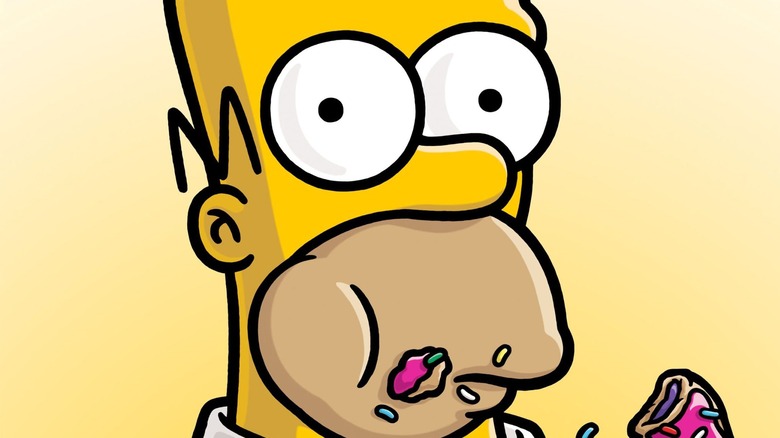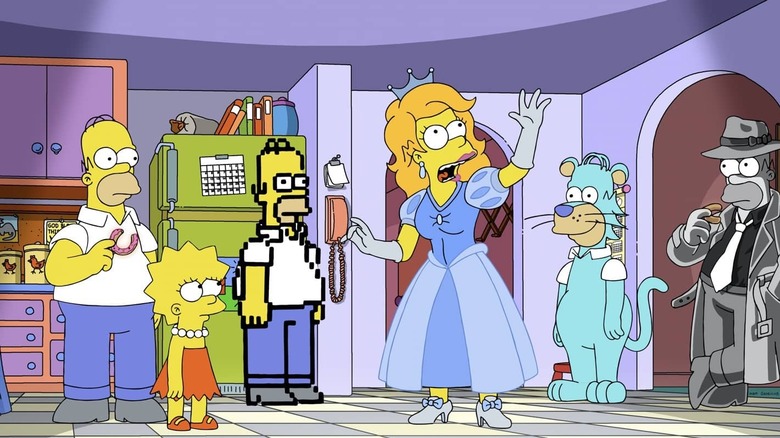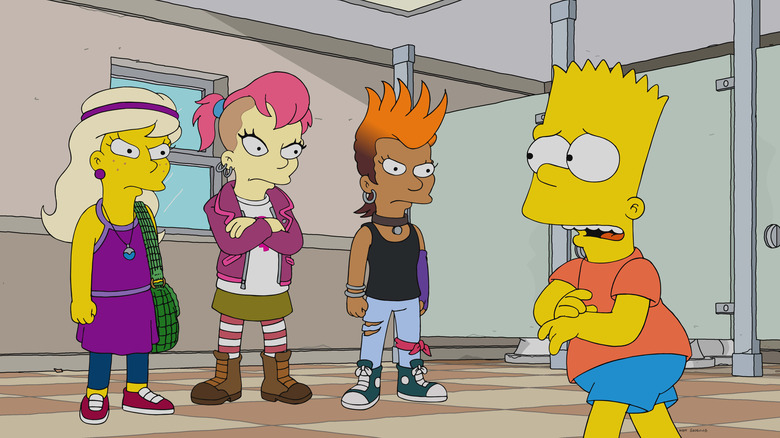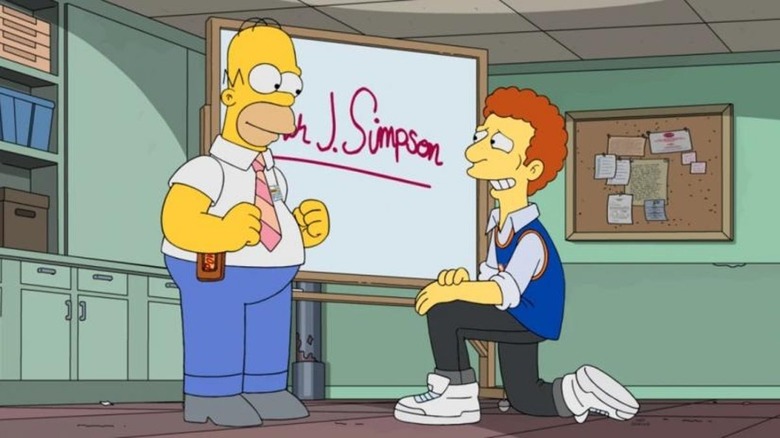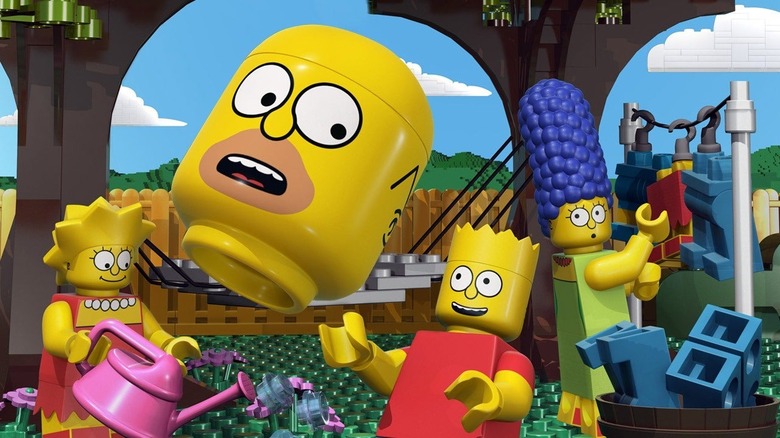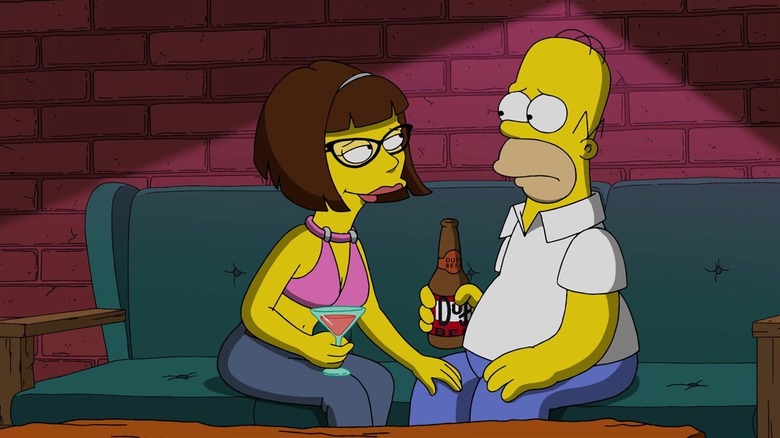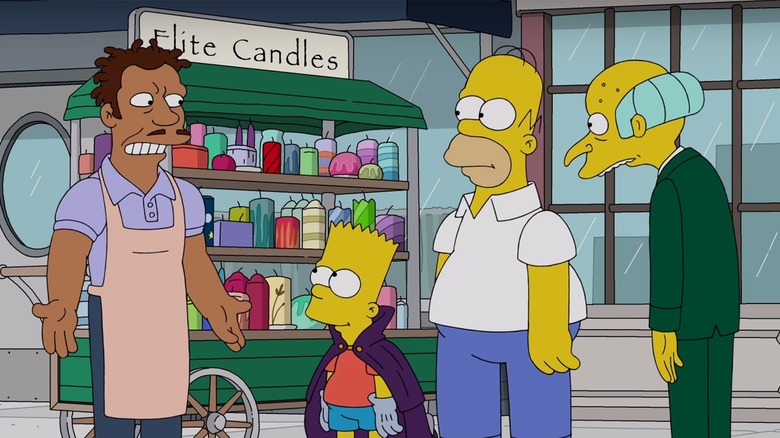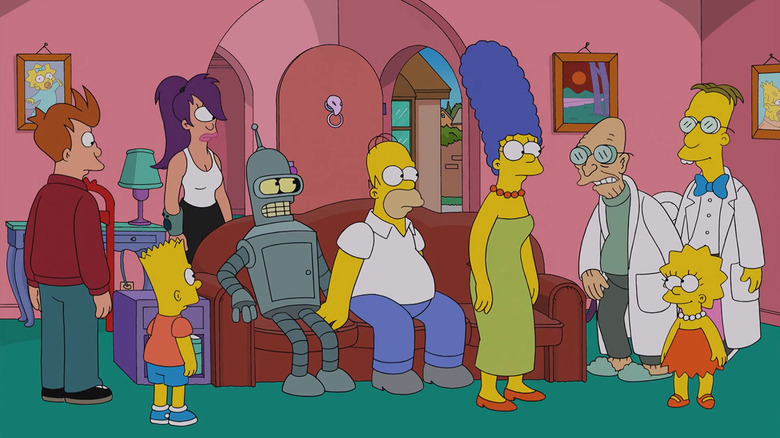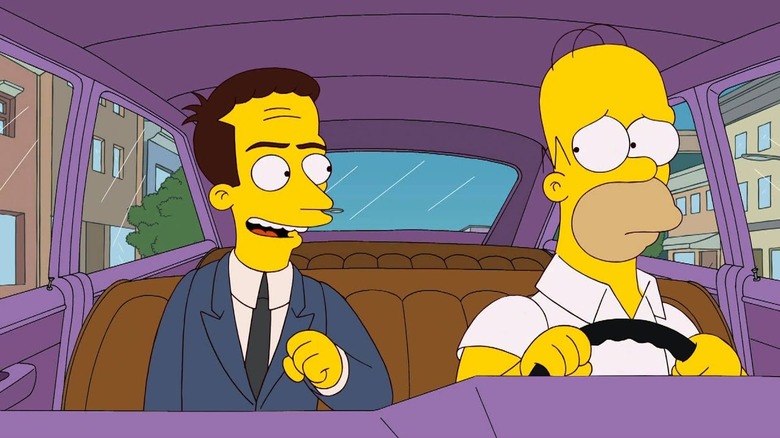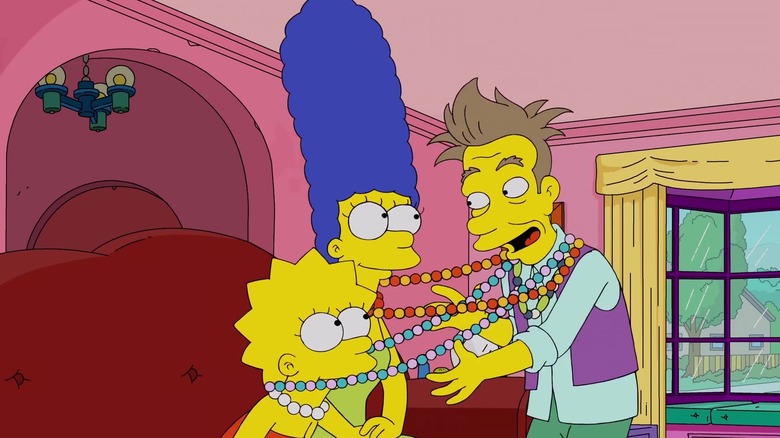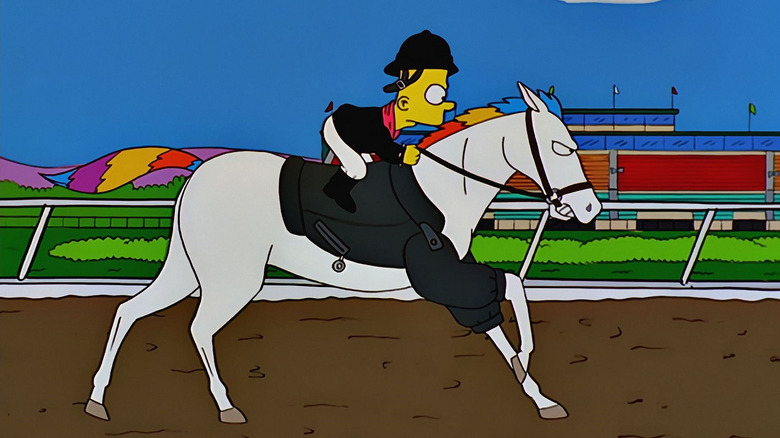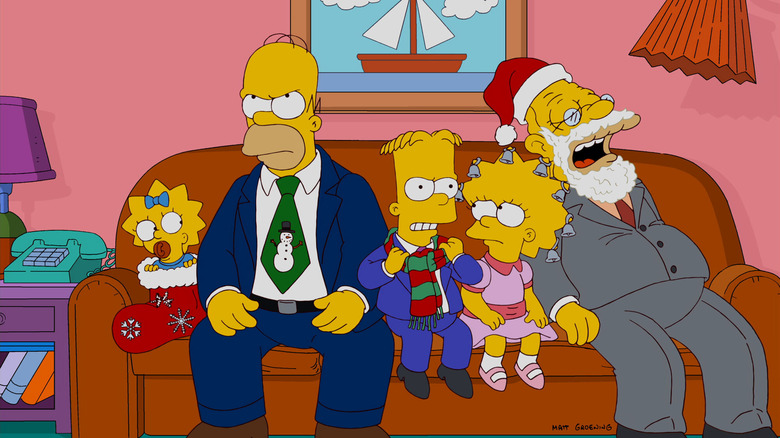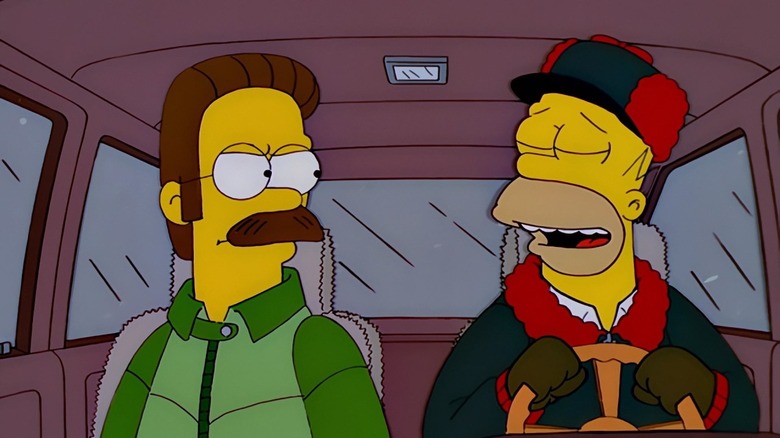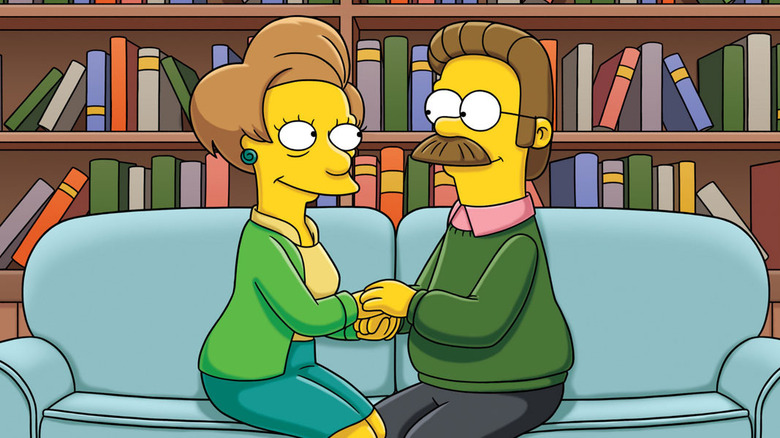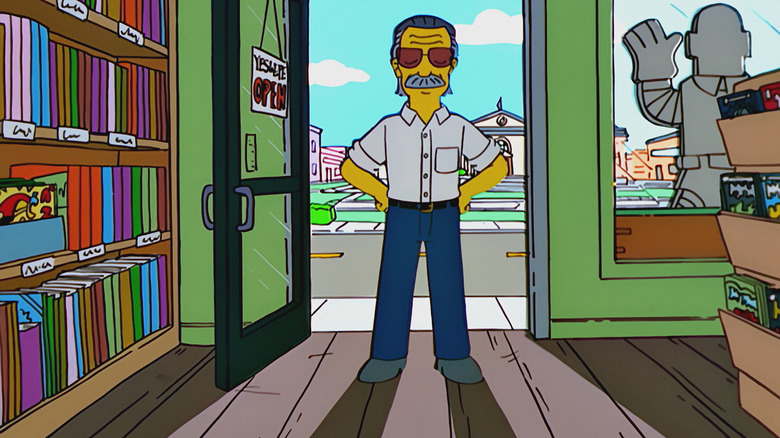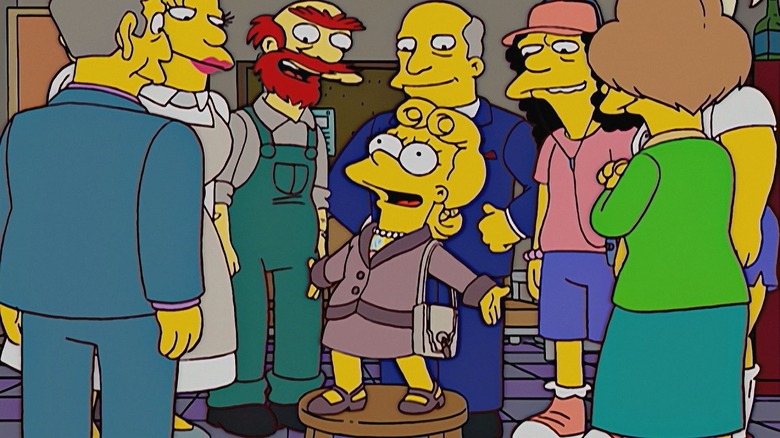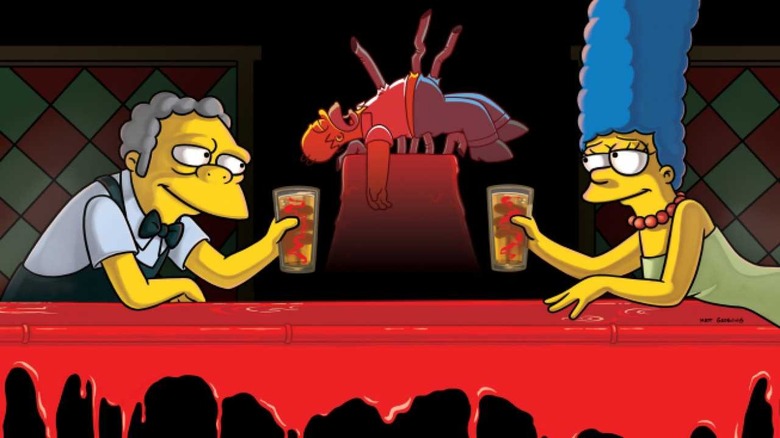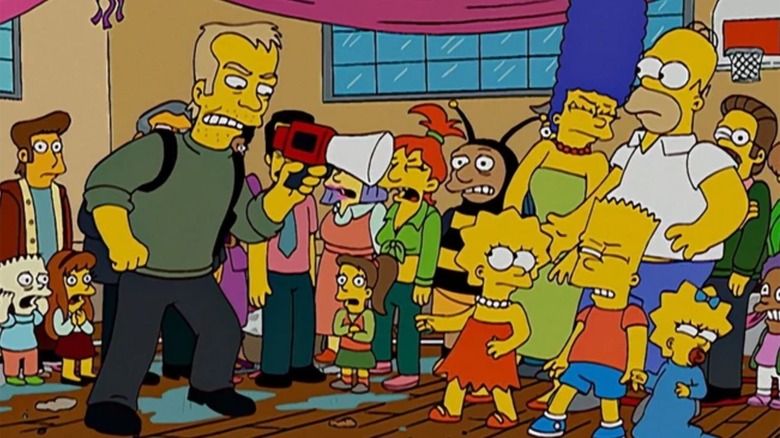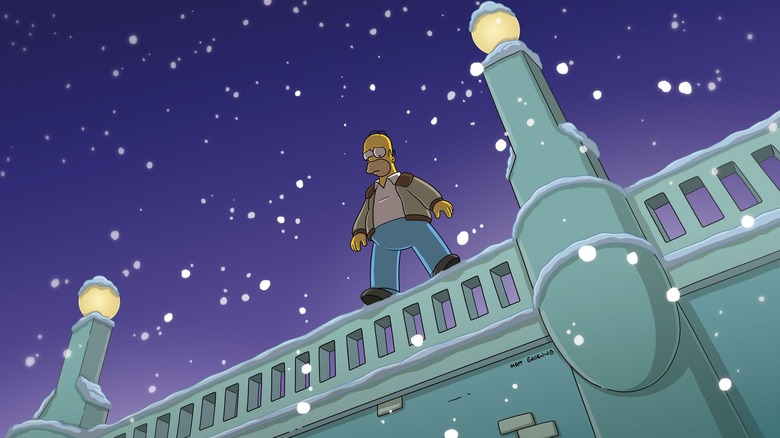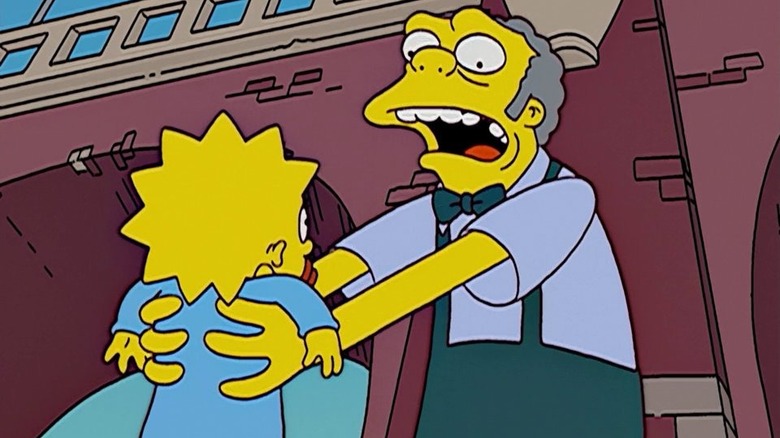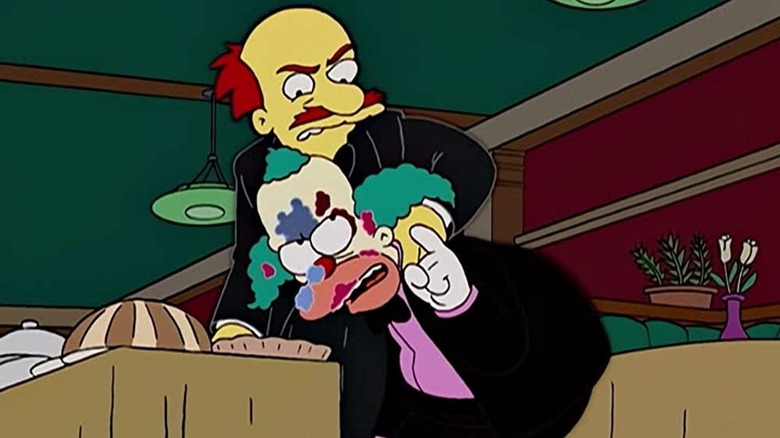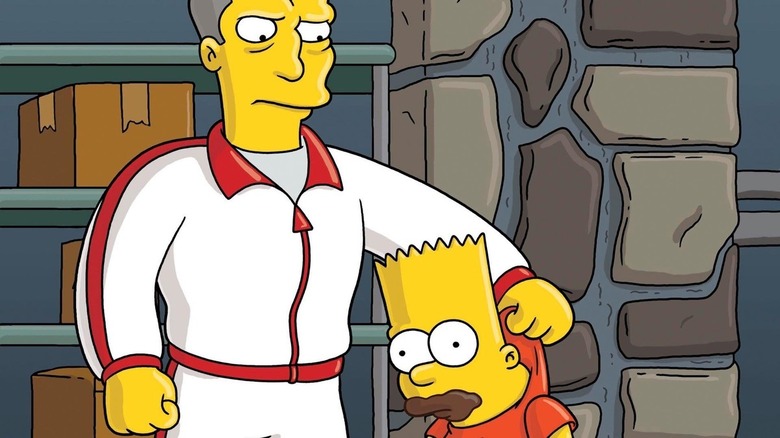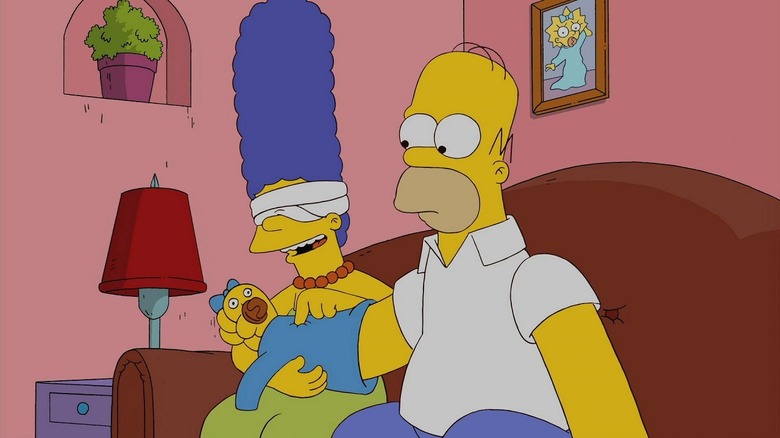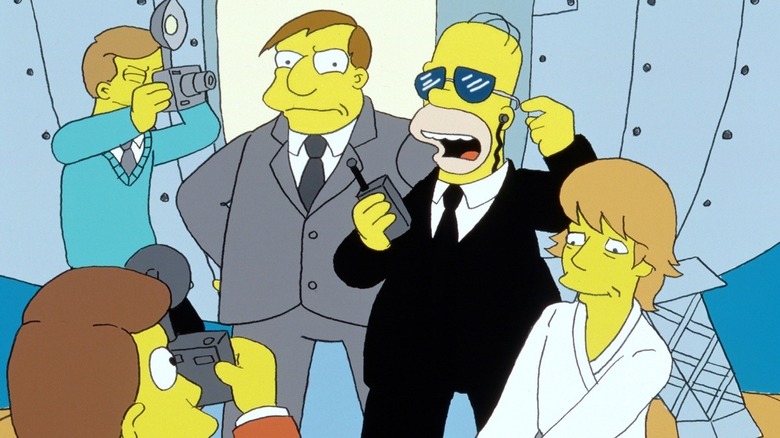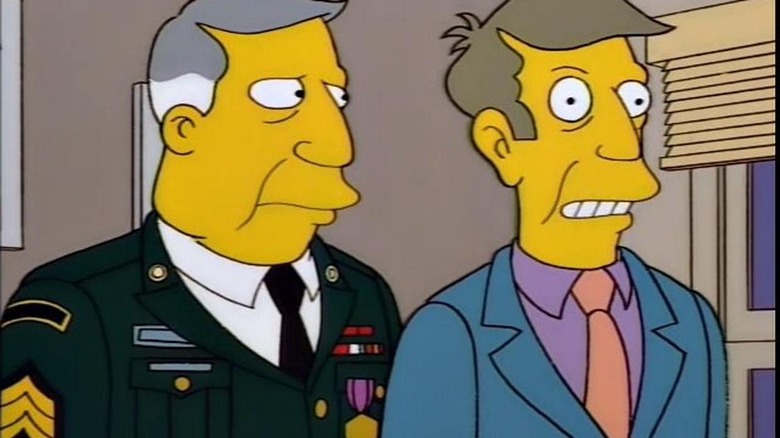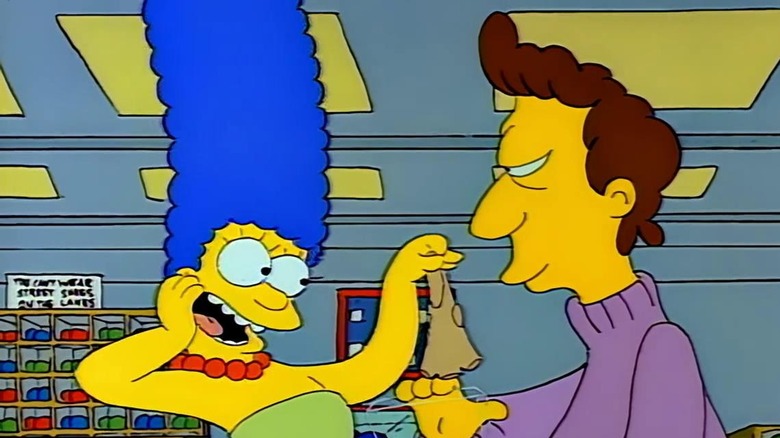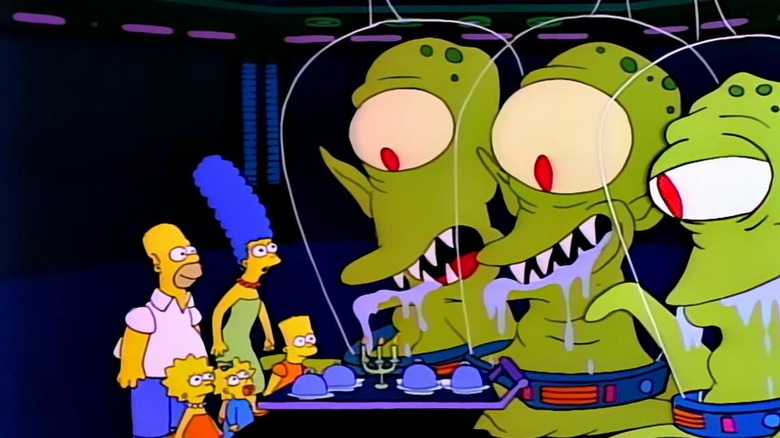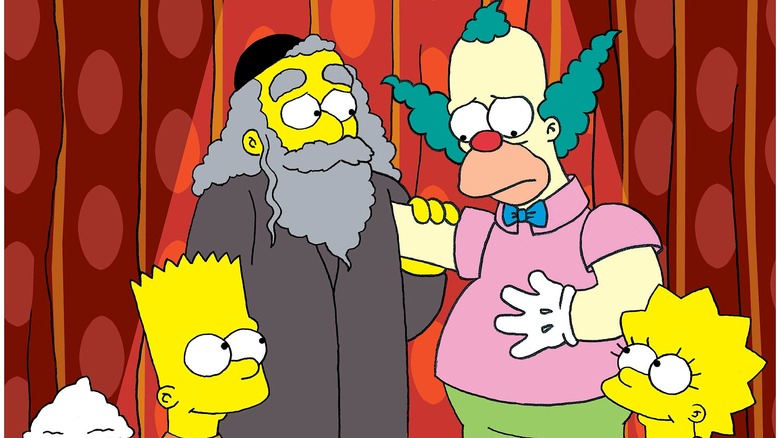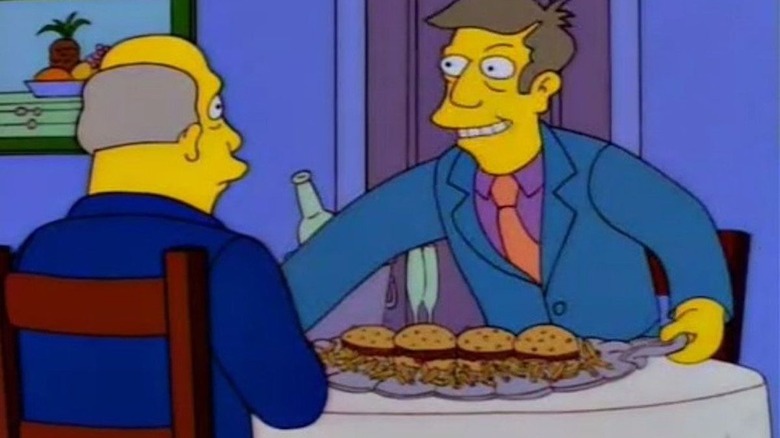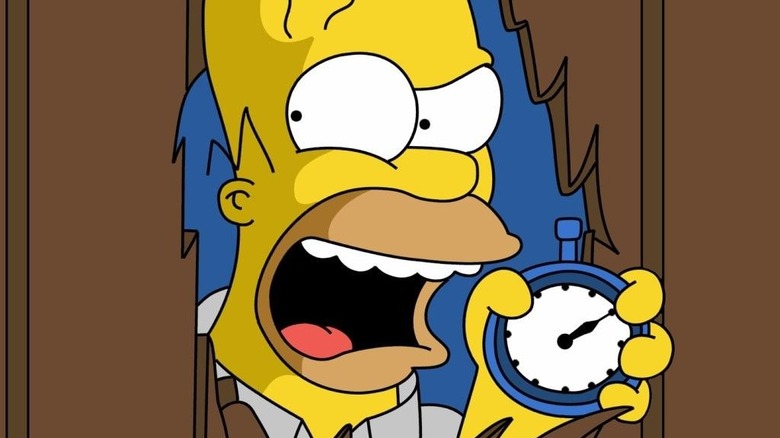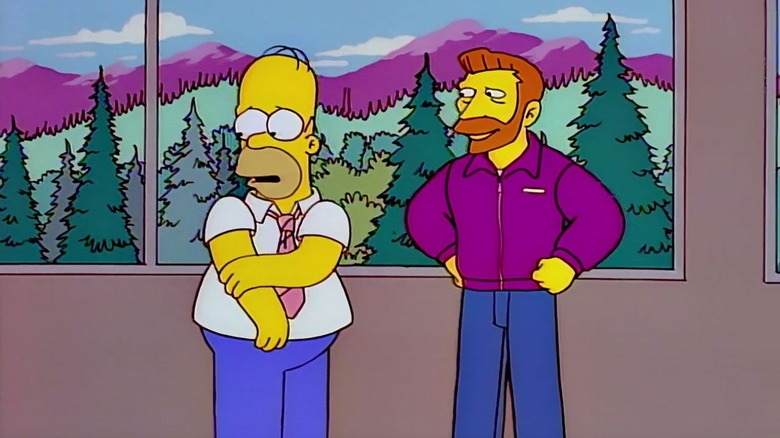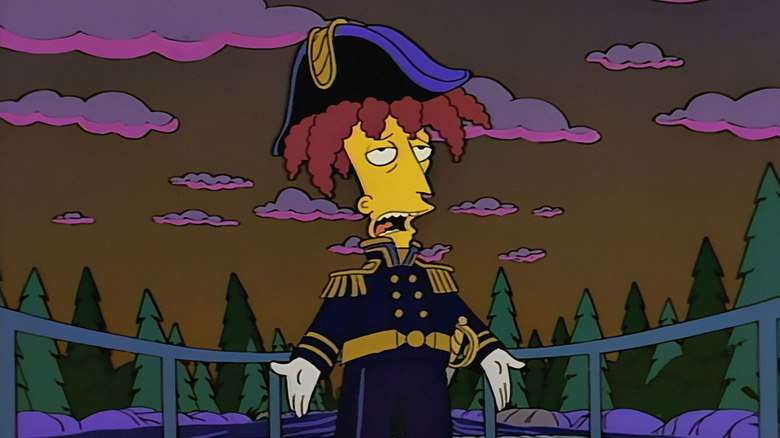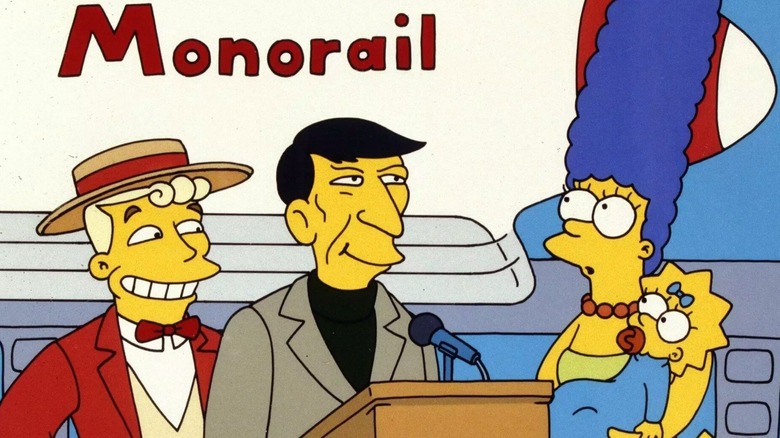Every Simpsons Season Ranked Worst To Best
We may receive a commission on purchases made from links.
"They'll never stop 'The Simpsons'," or so goes a song from one of the clip show episodes of "The Simpsons." At this point, that line feels more like a prophecy than a gag.
Having gone on for more than three decades, "The Simpsons" has morphed from an unprecedented game-changer for television comedy into a comforting mainstay of small-screen programming. Throughout that change, the series has delivered 706 episodes, the largest episode count for any American television show in history. Trying to break down the high and low points for any show that's been on for so many years can be challenging, if only because of the sheer volume of episodes there are to examine.
But undertaking that challenge through the form of ranking individual seasons of "The Simpsons" is a more manageable proposition. Such rankings study how a couple dozen episodes can come together cohesively to form themes, reveal the skills of writers, and speak about the year they were produced. It isn't just breaking down the greatest and crummiest episodes of the sitcom, it also puts into perspective how "The Simpsons" has evolved over the years.
With that in mind, here are our rankings of "The Simpsons" seasons from worst to best. Don't worry — since there's no stopping "The Simpsons," we promise we'll come back in another thirty seasons and add them to the rankings too.
32. Season 32
Despite frequently meager live ratings, "The Simpsons" can still make some headlines, as fans saw in the May 2021 episode "Panic on the Streets of Springfield," which riled Morrissey while lampooning his perceived hypocrisies. Other standouts of the season included "Undercover Burns" (which had Homer's crusty boss infiltrating the ranks of his employees as "Fred") and a memorable "Treehouse of Horror XXXI" that resulted in a viral clip about the horrors of voting in last November's election. It showed that even at its weakest powers, "The Simpsons" still served a vital satirical role in pop culture.
"Podcast News" and "The Road to Cincinnati" were two additional clever episodes, but others have been more hit-or-miss this season. Some claim that "The Simpsons" is on autopilot at times, with its animation and celebrity appearances especially feeling more mechanical than ever. To those folks, Season 32 would seem to be the best evidence yet — but to others, even a "bad" season of "The Simpsons" is still better than virtually any other sitcom on broadcast TV.
31. Season 30
The standout episodes of Season 30 of "The Simpsons" suggested a pathway for it to go forward with a second wind.
In "Bart vs. Itchy & Scratchy," guest writer Megan Amram ("The Good Place") gave the series a fresh voice. Season finale "Woo-Hoo Dunnit," meanwhile, utilized a unique documentary format to explore who stole Lisa's college fund.
Both episodes were examples of "The Simpsons" taking risks that paid off — but unfortunately, most of the season wasn't quite up to par with those high points. Like many later seasons of "The Simpsons," Season 30's biggest crime was being unremarkable, with episodes like "From Russian Without Love," that excelled only at being remarkably unmemorable. In retrospect, perhaps the most notable part of season was that iconic author Judy Blume served as a guest star.
30. Season 31
Season 31 offered up something that had only occurred two other times in the history of "The Simpsons" — a two-parter episode.
This long-form storyline was titled "Warrin' Priests" and inspired positive marks from critics, with The A.V. Club commending guest writer Pete Holmes ("Crashing") for returning meaningful discussion of theology to a show that once did it so regularly that an entire book was written about it. The rest of the season, however, offered few standout episodes.
Season 31 also revealed a trend that would become most noticeable in weaker seasons — an overreliance on trendy topics as plot fodder. From cryptocurrency to millennial co-workers to becoming over-dependent on technology, many of the jokes were obvious and the result seemed less a hysterical observation on present-day society and more a writer's room trying to find a new plot after nearly 700 episodes.
29. Season 25
One thing's for sure: "The Simpsons" wasn't short on gimmick episodes for Season 25.
These included "Brick Like Me," an episode where Springfield was rendered through LEGO bricks, "Married to the Blob," in which Comic Book Guy got a long-term Japanese girlfriend, and "Days of Future Future," an episode set in the distant future that served as a follow-up to the acclaimed episode "Holidays of Future Passed."
While gimmicks were abundant, thoughtful jokes and touching character beats were largely absent. One of the few memorable episodes of the season was "Steal this Episode," which had Homer setting up a ramshackle movie theater in his backyard that projected pirated movies. It was no "Marge vs. the Monorail," but there were amusing chuckles and guest stars, which was more than could be said for most of Season 25 of "The Simpsons."
28. Season 27
The lowest point of Season 27 came in "Much Apu About Something," an Apu-centric episode that attempted to address accusations he was a harmful caricature. Despite having the talented Utkarsh Ambudkar ("Brittany Runs a Marathon") guest-starring as Apu's cousin Jay, the episode was toothless and not all that funny.
It would be emblematic of the season as a whole, lacking bite and big laughs in episodes like "Every Man's Dream" — criticized by outlets like IGN for its clumsy storytelling. On the cusp of crashing through 600 episodes (the season 27 finale was the show's 596th episode), Season 27 seemed like something akin to a marathon runner around the 25th mile.
27. Season 28
Another strange trend about modern "Simpsons" is new installments that present themselves as quasi-sequels to classic episodes of the program. It's a distressing sign when the show feels the need to go this route, chasing the tail of storytelling from a bygone era.
The most blatant example of this trend in Season 28 was "Kamp Krustier," an unnecessary sequel to the season four installment "Kamp Krusty." Meanwhile, episodes directly tied to modern pop culture moments, such as the two-part "Empire" homage "The Great Phatsby," didn't fare much better. Instead of blazing new trails, Season 28 of "The Simpsons" grasped at straws.
26. Season 26
It's easy to call the most important episode of this season the crossover with Matt Groening's other iconic cartoon, "Futurama." But while "Simpsorama" wasn't terrible, it mostly hinged on a bunch of hollow callbacks to classic "Futurama" episodes. Sure, it was nice to hear Billy West and Joe DiMaggio, among the rest of the cast, inhabit their famous roles again ("Futurama" aired its last episode just a few months before this crossover), but the episode didn't offer much beyond that.
The rest of Season 26 was pretty perfunctory stuff, with a season finale couch gag crossing over the program with "Rick & Morty," reminding some viewers that modern animated cartoons may have supplanted "The Simpsons" in pop culture relevance.
25. Season 24
You'd think the prospect of having Steve Carell wander through Springfield as guest character Dan Gillick would produce some laughs, but "Penny Wise-Guys" ended up being one of the more forgettable episodes in Season 24.
On the whole, the guest stars in this season were pretty disposable, including Seth MacFarlane in the finale as a potential new lover for Marge. The better episodes here tended to eschew star-studded cameos in favor of simpler plotlines, like "A Test Before Trying" and its yarn about the fate of Springfield Elementary School hinging on Bart's test scores. It served as a good reminder that Bart's voice actor, Nancy Cartwright, remains as strong as ever at her comical line deliveries.
24. Season 29
Two episodes into Season 29, the show delivered a memorable episode called "Springfield Splendor," revolving around the relationship between Marge and Lisa as they worked on a graphic novel. The emotional beats felt earned, the script made effective gags out of the unique backdrop of graphic novels, and guest performers Alison Bechdel ("Dykes to Watch Out For" cartoonist known for The Bechdel Test) and Rachel Bloom ("Crazy Ex-Girlfriend") were fun in their screentime.
Unfortunately, "Splendor" was one of the peak episodes of this flawed season. Among those shortcomings were further examples of "The Simpsons" reaching back into older episodes for tired callbacks, such as "Singin' in the Lane," which reunited Homer's bowling team the Pin Pals from Season 7. Part of the fun of "Splendor" was its willingness to engage in new material, but taken as a whole, Season 29 frequently eschewed such a mindset.
23. Season 11
There may have never been a sharper plummet in quality on "The Simpsons" than what happened from Season 10 to Season 11.
While the preceding years had delivered a handful of puzzling episodes, Season 11 embraced a barrage of absurd storylines that seemed to be thumbing their nose at the audience and begging people to claim that "The Simpsons" had jumped the shark. Perhaps this could have all been seen as an interesting meta-commentary on long-running sitcoms ... if the episodes had been more amusing.
Instead, the season delivered all-time worst candidates like "Saddlesore: Galactica" and "Kill the Alligator and Run." The only real highlight of the season came during its requisite "Treehouse of Horror" installment, which included a segment that featured an amusing turn from Lucy Lawless ("Xena: Warrior Princess") as herself. Otherwise, Season 11 saw a shocking decline from what it was just a year prior, let alone in its glorious heyday.
22. Season 23
Another later season for "The Simpsons," another milestone in terms of longevity.
In Season 23, "The Simpsons" cracked 500 episodes, a feat celebrated with the thoroughly unremarkable episode "At Long Last Leave." Far more memorable from this season was one of the modern high points of the program, "Holidays of Future Passed."
Flashing forward to the future, "Passed" followed each of the three "Simpsons" kids and their unique struggles as parents (or expecting parents in the case of Maggie). There were inspired gags in watching the characters navigate the world of parenthood, and the emotional beats rang effectively true.
Unfortunately, the disparity in the two aforementioned episodes reflected the erratic nature of the season, which oscillated between enjoyable romps like "The Book Job" to forgettable duds like "Politically Inept, with Homer Simpson." As one of Mr. Burns' monkeys might put it, Season 23 of "The Simpsons" was the best of times and the blurst of times.
21. Season 12
The last season of "The Simpsons" crafted under the legendary stewardship of showrunner Mike Scully, Season 12 was a mixed bag with fleeting moments of true greatness.
Those moments do exist for those who want to go back and watch them, thanks in large part to inspired episodes like "Trilogy of Error" and "Skinner's Sense of Snow." Much of the season, however, was dragged down by plots whose writing process seemed to begin and end with a one-sentence pitch.
"Simpsons Safari," for example, sent the titular family to Africa; a slew of generic "comedic" antics involving Homer's encounters with a Maasai tribe and a Jane Goodall knock-off ensued. The episode lacked both imagination and inspiration, and the same held true for several other installments in the season.
20. Season 22
Season 22 contained one of the most dated episodes of "The Simpsons" with "The Real Housewives of Fat Tony," which was an extended "Jersey Shore" homage.
While the best pop culture references in "The Simpsons" have always worked for both novices and experts alike, all the gags in "Housewives" seemed intent only on reminding viewers that "Jersey Shore" was a TV show that existed at the time. It set a low point for a season that had its share of entertaining antics, including the amusing episode "Flaming Moe", which had Moe turning his tavern into a gay bar.
While it's true that no season featuring a Werner Herzog guest appearance can be called a wash, too many Season 22 episodes leaned towards "Housewives" in terms of quality.
19. Season 13
With this particular season, Al Jean returned to the position of showrunner for the first time in nearly a decade. It was a momentous moment in the show's history, given that he has occupied the role for nearly two decades since.
Jean's return also allowed the show to improve over its lackluster preceding two seasons. Gone were overly wacky plotlines that dominated the back-half of Mike Scully's tenure as showrunner. Instead, "The Simpsons" put out painless, unremarkable episodes like "Blame It on Lisa" alongside transcendent ones like "I Am Furious (Yellow)," which featured an appearance from Stan Lee. The idea of this comic book legend showing up for a cameo in a pop-culture property was nothing new, of course — but Lee's inspired role as a warped version of himself who refused to leave Comic Book Guy's Android Dungeon store was the sort of fun twist Season 13 should have embraced more frequently.
18. Season 15
With Season 15, "The Simpsons" decided to go where no comedy program had gone before: "Star Wars" prequel jokes.
The episode "Co-Dependent's Day" began with an extended riff on the program's equivalent to that sci-fi franchise, "Cosmic War," delivering a crummy prequel to rival "The Phantom Menace." Unfortunately, Jar-Jar jokes were already tired and there wasn't much in terms of humor save for the funny gag of Otto accidentally getting stuck watching a drama about the plight of British coal miners instead.
"The Simpsons" opted for a lot of that kind of safe, familiar humor this season, though that doesn't mean viewers were entirely devoid of quality comedy. Most notably, this was the season responsible for an excellent musical episode entitled "The President Wore Pearls," delivering an "Evita" lampoon with some surprisingly catchy ditties.
17. Season 21
Among the most memorable (for all the wrong reasons) episodes in Season 21 of "The Simpsons" was "The Color Yellow," which detailed the trials and tribulations of distant Simpson relative Virgil, a runaway slave.
That may sound like a tricky storyline for any TV show to tackle, because it is; "The Simpsons," unfortunately, wasn't up to the task. More successful, humorous episodes included Sideshow Bob returning for the ludicrous production "The Bob Next Door," as well as one of the best "Treehouse of Horror" installments in "Treehouse of Horror XX," which delivered parodies of Hitchcock, "28 Days Later," and "Sweeney Todd."
Each of those "Treehouse" segments proved much more enjoyable (and somehow less scary) than the awkward time "The Simpsons" tried to make one of the family's ancestors a runaway slave.
16. Season 18
In the best seasons of "The Simpsons," it's hard to decide which episode was the season's high point. For Season 18, there's no such problem.
"24 Minutes," a parody of "24," was without equal among the season's collection of 22 episodes. Much like "The Springfield Files" from a decade earlier, "24 Minutes" parodied a famous FOX drama with remarkable attention to detail, while making sure the episode's gags could stand on their own two feet.
Although the power of Jack Bauer provided the peak of the season, there were still several installments here (like "Moe'N'a Lisa") that proved worthwhile. On the other hand, weaker entries such as "Kill Gil (Volumes 1& 2)" relied on tired jokes and unimaginative pop culture references, indicating the potholes that would take down many late-era "Simpsons" episodes.
15. Season 19
The first season after "The Simpsons Movie" injected some new life into the franchise, Season 19 had several episodes that qualified as outright gems.
"Husbands and Knives," for example, made great use of comic book legend guest stars like Art Spiegelman ("Maus"). The episode "Eternal Moonshine of the Simpsons Mind" made great use of an in-media res story format that kept you guessing as to what led to Homer Simpson blocking out his memory. As for "Dial 'N' for Nerder," that episode featured a makeout scene between Homer and a rack of lamb that has to be seen to be believed.
True, this is the season with the infamous "That '90s Show" episode that rewrote the mythos of "The Simpsons" in the name of derivative 1990's pop culture references. But at least Season 19 delivered some enjoyable laughs, even in its most lackluster plots.
14. Season 14
Matt Selman has always seemed to bring out the best in modern-day "Simpsons" storytelling. Not only is there a noticeable increase in quality in post-Season 20 episodes that he has executive produced, but he also wrote a number of classic "Simpsons" episodes, including the Season 14 entry "The Dad Who Knew Too Little."
Selman wasn't the only one delivering standout episodes here, however. Director Lauren MacMullen oversaw the noteworthy "Moe Baby Blues" (which brought humor and pathos to an unlikely friendship between Moe and Maggie), and even dud episodes like "Large Marge" reflected well on the more talented artists working on the series.
13. Season 17
For Season 17, "The Simpsons" expanded its focus to episodes starring supporting characters who hadn't received much prior time in the spotlight. The results were surprisingly successful.
Groundskeeper Willie proved capable of sustaining his own story with the musical parody "My Fair Laddy," the multi-narrative installment "The Seemingly Never-Ending Story" gave a prominent role to the Rich Texan, and even Patty & Selma got their own solo storyline to examine their undying love for the TV show "MacGyver." A willingness to explore these side figures was one of the benefits of Season 17, laying the groundwork for many essential facets of their personalities.
12. Season 16
Sometimes, later seasons of "The Simpsons" have employed contrived plot turns that aim for humor but instead smacked of laziness. One of the better examples of this trend came in the final minutes of "Don't Fear the Roofer."
The episode dealt with the idea that Homer's new best friend, a kindly roofer voiced by Ray Romano, wasn't real. Using some humorously over-the-top methods (complete with a Stephen Hawking cameo) to explain how the character avoided being seen by anyone else, "Roofer" marked an entertaining highlight in one of the stronger post-2000 seasons for "The Simpsons." Other standout episodes for this season included the return of Albert Brooks and his gift for improvised comedy in "The Heartbroke Kid" as well as "Midnight RX," which involved Homer leading a series of pill heists in Canada.
11. Season 20
The first season of "The Simpsons" to be shown in high-definition, this leap in animation quality inspired a strong modern collection of episodes for "The Simpsons."
Among the better installments were a "Treehouse of Horror" including an impressively faithful homage to "It's the Great Pumpkin, Charlie Brown," and the "Da Vinci Code" pastiche "Gone Maggie Gone." Even an episode involving Marge working at an erotic bakery turned out to be good for some hearty laughs. Change can be essential for inspiring creativity, and in the case of "The Simpsons," switching up to high-definition coincided with a creative resurgence for the program.
10. Season 10
With this season, "The Simpsons" had been on for an entire decade. When a TV show has been around that long, it's bound to start seeing some decline in quality.
Luckily, Season 10 didn't drop too drastically. However, episodes like "Sunday, Cruddy Sunday" did indulge in the sort of shallow celebrity guest stars and pointlessly ridiculous plot turns that would come to define the worst episodes of "The Simpsons." On the brighter side of things, outings like "Simpsons Bible Stories" and "Mayored to the Mob" were on par with the classic episodes. They remain much better episodes than you'd find in your average show that had survived to see a Season 10.
9. Season 9
For the Season 9 premiere, "The Simpsons" took its titular family on a trip to New York City. Homer and the gang's first visit to the Big Apple would become one of the best iterations of the "Simpsons go to [insert famous place here]" story mold, if only for the gag where Homer had to choose between drinking Mountain Dew or Crab Juice.
Right after that episode came "The Principal and the Pauper," an infamous one that foreshadowed the gimmicky storytelling which would dominate subsequent seasons. Luckily, that foible would become more apparent later on, as the ninth season remained largely enjoyable if decidedly less so than the last few. Among the most entertaining outings this go-around was "Reality Bites" (featuring the last appearance of Phil Hartman's Lionel Hutz), and Homer's love for firearms in "The Cartridge Family."
8. Season 1
In Season 1, "The Simpsons" was not burdened by many expectations. Airing on the newbie-network FOX and spun off from bumpers on "The Tracey Ullman Show," no one was expecting it to become the polished comedy machine it would evolve into in later years.
The animation was cruder, the characters hadn't gelled into their famous personalities yet, and the stories weren't as daring as later seasons. Yet, there was still something remarkable about this trailblazing season of television. Episodes like "Krusty Gets Busted" had the kind of laughs and storytelling that would turn the series into a pop culture sensation. Other installments like "Moaning Lisa" and "Life on the Fast Lane" contained mature, thoughtful handling of themes like infidelity that even modern-day adult cartoons struggle to capture. The edges in this inaugural "Simpsons" season are rough to look back on now, to be certain, especially in "Some Enchanted Evening." The high moments, however, foreshadowed the pop culture institution "The Simpsons" would become.
7. Season 2
One of the many ways "The Simpsons" demonstrated how much more creatively confident it was becoming in Season 2 was through establishing series hallmarks like the annual "Treehouse of Horror" episode. The inaugural entry in this staple of the program isn't one of the best installments, but it did show that "The Simpsons" was willing to stretch its legs and do the unexpected.
Other episodes in the season zeroed in on side characters like Seymour Skinner, while an installment focusing on Itchy & Scratchy further expanded the world of Springfield. Growing pains aside, the second "Simpsons" season showed a promising ability to grow and improve.
6. Season 3
"The Simpsons" gained more confidence in each successive season, and Season 3 seemed to be when it finally understood what it was.
Featuring an expansive rogue's gallery of Springfield falling into place, and writers realizing the value of telling stories with all members of the family rather than just focusing on Bart, "The Simpsons" finally spread its wings and fly.
This level of confidence resulted in all-time great episodes such as "Like Father, Like Clown" and "Flaming Moe's." Even better, this season's episode "Black Widower" established Sideshow Bob as a recurring antagonist for the entire series rather than just a one-off guest character. It's just one of many foundational elements of "The Simpsons" that was established during this vital season.
5. Season 7
One impressive element of "The Simpsons" is its ability to wring pathos out of silly yellow cartoon people. This became especially apparent in one of the best episodes of Season 7, entitled "Mother Simpson."
The episode closed out not with an extended pop culture reference, but instead Homer sitting on his car looking at the stars in a contemplative state after his long-lost mom had vanished again. It was a touching moment that reaffirmed how these goofballs had managed to wriggle their way into people's hearts after seven years on the air.
But it wasn't all tears in this superb season. Episodes like "Homer the Smithers" and "22 Short Films About Springfield" contained some of the most inspired gags in the entire show's run, with the latter delivering the deservedly legendary "Steamed Hams" exchange that has become a beloved meme.
4. Season 6
"Treehouse of Horror" episodes are usually a highlight of any classic "Simpsons" season. However, Season 6 took the cake in terms of quality "Treehouse of Horror" installments, since it contained "Treehouse of Horror V." The "Time and Punishment" segment packed an astonishing amount of laughs into just seven minutes of screentime.
But the memorable gags were not just limited to the Halloween-themed episode. This whole season was crammed with classic "Simpsons" installments, with the flashback episode "And Maggie Makes Three," as well as the "101 Dalmatians" parody "Two Dozen and One Greyhounds" being highlights.
3. Season 8
If you were to sit down and watch an episode at random from Season 8, you couldn't go wrong.
From top to bottom, the season was an avalanche of great comedy, from "The Springfield Files" (an "X-Files" pastiche with guests Gillian Anderson and David Duchovny that works even if you've never the show) to "The Simpsons Spin-off showcase" (which lampoons three different kinds of TV programs to hysterical results) to "You Only Move Twice," which had Homer moving to a new job under what amounted to a James Bond villain named Hank Scorpio).
Voiced by Albert Brooks, every line out of Scorpio's mouth became an instant fan-favorite ("I don't expect anything from you, except to die and be a very cheap funeral!"). Scrorpio, like Season 8 itself, was "The Simpsons" we all know and love.
2. Season 5
Who knew an episode that had to be stuffed with extra gags to meet its runtime requirement would be one of the high points of "The Simpsons" as a TV show?
That installment, "Cape Feare," remains a fantastic piece of comedy, but it wasn't the only classic episode to come from Season 5. There was Mr. Burns and the hunt for his teddy bear in "Rosebud," Homer going to the stars in "Deep Space Homer," and classic appearances by celebrity voices like Buzz Aldrin and James Taylor. Bonus points for this season being the one that dedicated an entire episode to the question "What if Bart got an elephant?"
1. Season 4
By Season 4, "The Simpsons" had become the very best version of itself. The uncertainty that plagued its earliest episodes was a distant memory, and now the show could do things like tell an entire "Treehouse of Horror" segment in black-and-white or tackle the concept of religion in the episode "Homer the Heretic."
This level of confidence further inspired some of the most outlandish and entertaining episodes of the program's run, like "Marge vs. the Monorail," fueled by wall-to-wall gags. The fourth season also delivered the episode "Last Exit to Springfield," regarded by many to be the show's finest moment. Season 4 of "The Simpsons" was non-stop comedy gold, is still considered a zenith in comedy history, and will leave even the most jaded viewer going "Woo-hoo!"
